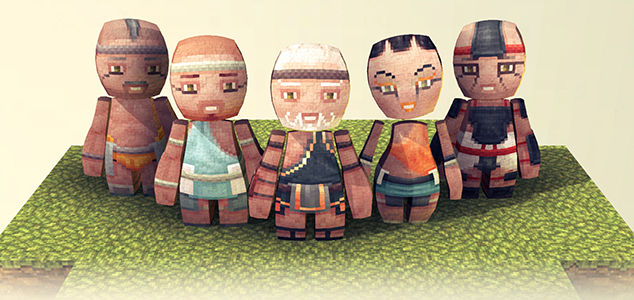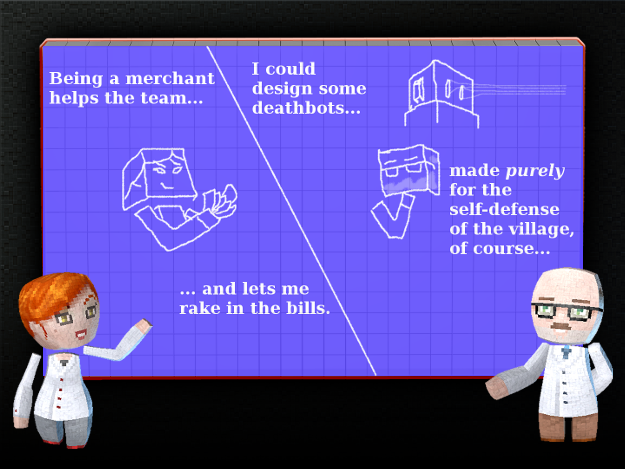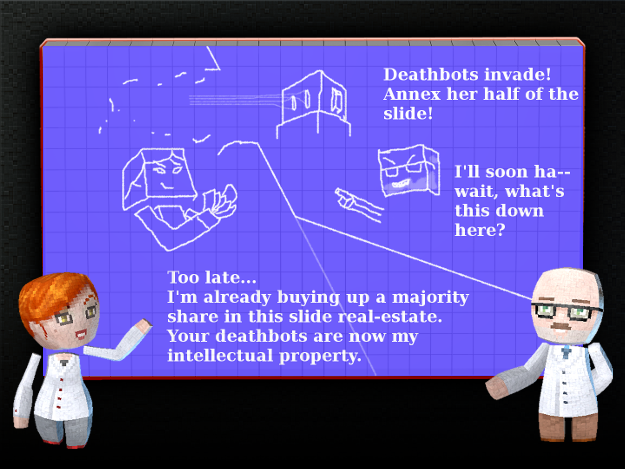
Since we’ve talked about potential non-combat player roles in several articles this month, we wanted to close out the month by discussing the impact multiplayer will be able to have on different player roles. Although we hope to eventually have a global persistent server eventually, we are focusing on trying to deliver both a single-player and a private server small multiplayer game.
“I don’t really like shooters, let’s play something else…”
When trying to play multiplayer games with friends, family, or loved ones, the problem of differences in tastes is a difficult challenge to overcome, unless you happen to only make friends by playing online games. People naturally tend to want to play games where they fill different roles, or find different kinds of engagement fun.
Since Imagine Nations is a game where players can fill any role in a simulated society, from president to general, to engineer, to captain of a ship, to farmer, to dungeon-diver, to some hobo that kills rats in alleyways and eats their meat while the rest of the villagers just back away slowly, it’s possible to have a game where everyone can agree to play different roles in the same game.
It would be difficult for a player to be a mayor and also a general and also an engineer building the castles or spaceships all by hand all at the same time, just because of how many tasks you have to juggle all at once. (Or be a ship’s helmsman and weapons officer at the same time… Or be both managing the factory floor to get a new product produced while also leading the trade caravans through bandit-infested lands unpillaged…) AI-controlled villagers perform those roles when a player can’t fill them, but multiplayer opens up the possibility of having teamwork coordinating a culture’s government, a major business, or a ship while having every position someone wants to play filled by an actual human.
Likewise, a militant action player might play the “hero” on the front lines, leading the troops personally through the tough spots, while a more deliberative military player might be the general that controls the whole flow of battle, and still another, more peaceful player might be the mayor who keeps the homefront together, and makes sure the food and supplies are manufactured and delivered to the troops, and still another player may be a diplomat keeping the coalition of villages or cultures together and united against a common enemy. A player who doesn’t like shooters never has to pick up a gun (or sword or magic wand) if they don’t want to do so, but still cooperate towards a common goal with a player who does nothing but shoot. Players can all be working as a team, even when playing what are effectively entirely different games.
When There Really Is No “I” in “Team”
Of course, having multiplayer in a world where you have the option to fill many roles opens up many possible forms of competition, as well. The violent competition types are obvious, ranging from simple FPS-like play to having opposing generals in a conflict between nations becoming something RTS-like in gameplay. However, not-combat competition is still also possible: Who can make a corporation wealthy enough to buy the other player’s corporation whole? Who can bring their culture from Stone Age to Space Age first?
Players can even play indirectly competitive games: A player in a government leadership role might be trying to negotiate peace, while a merchant player whose profits boom during conflicts might be antagonizing both sides to keep a fight going. Neither player may realize they are being thwarted by the other until they recognize that their efforts seem to be meeting stiffer opposition than normal.
Considering that there are so many potential roles or sub-roles to fill, the potential for cooperation or competition is nearly endless. Since it’s entirely possible players create whole new roles we don’t expect, or player demand pushes the game in some new direction, multiplayer means that players aren’t constrained to a competition or cooperative endeavor that we force everyone to play by. (At least, unless players want to play by special constraints.) This means “winners” and “losers” are determined only by the player’s own perspective. You can compete or cooperate in ways we never expected.
-The Imagine Nations Team
Support the Imagine Nations Crowdfunding Campaign today!




A player in a government leadership role might be trying to negotiate peace, while a merchant player whose profits boom during conflicts might be antagonizing both sides to keep a fight going.
Well, you just explained the Clone wars.